« January 26, 2005 | Main | January 28, 2005 »
Thursday, January 27, 2005
Entropic Storm: Fourmilab sans eau
If you think having your Internet connection go down is irritating, try going for a couple of days without running water. On Tuesday, the 80 mm steel pipe which supplies water to Fourmilab burst, leaking water at the rate of 200 m³/day (folks, that is a lot of water), most of which was evacuated through the ground water collection system until the main valve was closed late Tuesday afternoon. The most probable location of the leak happened to be under a mountain of snow piled up after removal from the driveway, which mountain had to be moved Wednesday morning before prospecting for the leak could begin, using a sensitive ground conduction microphone to localise its subterranean source.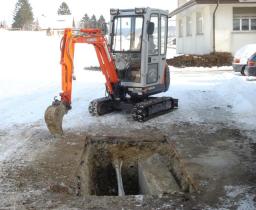 Wednesday afternoon was spent digging up the driveway, homing in on the position of the pipe, and verifying that we'd found the leak--there was nothing subtle about it--the steel pipe was completely cracked in two. Neither I nor the utilities guy from the commune had ever seen anything like this before--in my experience pipes tend to fail with a linear fissure along
their length (or eaten away with electrolysis). This pipe looked
like God's own sledgehammer had fractured it.
Wednesday afternoon was spent digging up the driveway, homing in on the position of the pipe, and verifying that we'd found the leak--there was nothing subtle about it--the steel pipe was completely cracked in two. Neither I nor the utilities guy from the commune had ever seen anything like this before--in my experience pipes tend to fail with a linear fissure along
their length (or eaten away with electrolysis). This pipe looked
like God's own sledgehammer had fractured it.
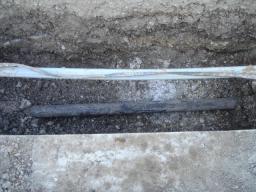 Having located the leak (or, as my entropic storm-tossed brain persisted in deeming it, "the first leak"), Thursday morning was spent expanding the hole around the leak both downward below the one metre depth where the water pipe ran (to avoid freezing--did I mention that this fun-fest was conducted in temperatures of -10°C?) to make room for the splice sleeve, and along the run of the pipe to have enough room for the splice and to ensure we'd removed all of the failed section. The picture at the left shows the failed pipe after it had been fully excavated. The failure isn't obvious in this picture (click on the image for an enlargement), but it's about one quarter of the way from the right of the trench. The grey tube above the black water pipe is the conduit in which the telephone lines run into Fourmilab; above it is a solid metal ground conductor to protect the phone lines from lightning strikes.
Having located the leak (or, as my entropic storm-tossed brain persisted in deeming it, "the first leak"), Thursday morning was spent expanding the hole around the leak both downward below the one metre depth where the water pipe ran (to avoid freezing--did I mention that this fun-fest was conducted in temperatures of -10°C?) to make room for the splice sleeve, and along the run of the pipe to have enough room for the splice and to ensure we'd removed all of the failed section. The picture at the left shows the failed pipe after it had been fully excavated. The failure isn't obvious in this picture (click on the image for an enlargement), but it's about one quarter of the way from the right of the trench. The grey tube above the black water pipe is the conduit in which the telephone lines run into Fourmilab; above it is a solid metal ground conductor to protect the phone lines from lightning strikes.
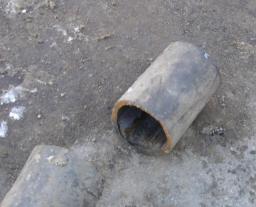 The failed section of the pipe was cut on either end with a diamond
cut-off saw--as soon the first end was cut, the segment of pipe fell apart at the break. At the left are both pieces of the removed pipe, showing the break on the shorter end. Clearly, from the rust around most of the fracture, the failure occurred over an extended period, starting as a slow leak from a hairline fracture and only failing catastrophically a few days ago.
The failed section of the pipe was cut on either end with a diamond
cut-off saw--as soon the first end was cut, the segment of pipe fell apart at the break. At the left are both pieces of the removed pipe, showing the break on the shorter end. Clearly, from the rust around most of the fracture, the failure occurred over an extended period, starting as a slow leak from a hairline fracture and only failing catastrophically a few days ago.
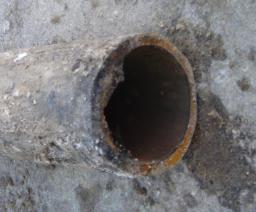 At the right is the other end of the fracture. At the top of the pipe (which was the bottom while in place) is some ice which formed due to residual water and ground water seepage. Although the temperature was unusually low during this event, freezing had nothing to do with the pipe's breaking--it was just the usual entropic storm pile-on. The plumber who installed the splice said that he'd seen a number of similar failures. Apparently, steel pipes buried the 30-40 years ago when Fourmilab was built were relatively brittle, and slow ground motion (due, in all likelihood, to construction in the vicinity and its perturbation of groundwater flow) is sufficient to make them shatter. Today, a more ductile alloy is used which is less prone to shatter due to slow creep. That's nice to know, but those of us with long runs of the old, brittle pipes beneath hideously expensive to dig up stuff have plenty of new material to inspire Old Facefull nightmares.
At the right is the other end of the fracture. At the top of the pipe (which was the bottom while in place) is some ice which formed due to residual water and ground water seepage. Although the temperature was unusually low during this event, freezing had nothing to do with the pipe's breaking--it was just the usual entropic storm pile-on. The plumber who installed the splice said that he'd seen a number of similar failures. Apparently, steel pipes buried the 30-40 years ago when Fourmilab was built were relatively brittle, and slow ground motion (due, in all likelihood, to construction in the vicinity and its perturbation of groundwater flow) is sufficient to make them shatter. Today, a more ductile alloy is used which is less prone to shatter due to slow creep. That's nice to know, but those of us with long runs of the old, brittle pipes beneath hideously expensive to dig up stuff have plenty of new material to inspire Old Facefull nightmares.
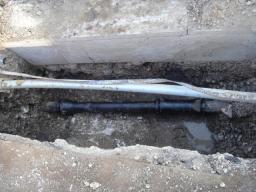 Once the broken pipe was removed, remediation consisted of installing
a replacement pipe, also steel, with a sliding sleeve joint which fit over the ends left when the failed section was cut out. The sleeve has joints with what appear to be brass compression gaskets, which are forced into a seal by extensive pounding on a large wrench with a substantial sledgehammer.
When visiting southern Africa, few sights are as common as women carrying large jugs of water on their heads from the river back to their villages. The miracle of pure water, distributed on demand to every household at the turn of a tap, is something which is difficult to fully appreciate until you've done without it for a few days.
Once the broken pipe was removed, remediation consisted of installing
a replacement pipe, also steel, with a sliding sleeve joint which fit over the ends left when the failed section was cut out. The sleeve has joints with what appear to be brass compression gaskets, which are forced into a seal by extensive pounding on a large wrench with a substantial sledgehammer.
When visiting southern Africa, few sights are as common as women carrying large jugs of water on their heads from the river back to their villages. The miracle of pure water, distributed on demand to every household at the turn of a tap, is something which is difficult to fully appreciate until you've done without it for a few days.